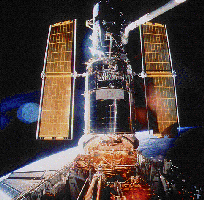

|
Instructor: Dr.
Ringwald |
Phone: 321-674-7135 |
Office: S418 Crawford, 4th floor
Office hours: TTh 3:30-5 and 8-10 p.m. and by appointment,
but please e-mail or phone first.
Course Description (from the 1999-2000 University Catalog):
(3 credits).
A detailed introduction to the techniques and instrumentation used in
modern observational astronomy and space science. Topics include
astronomical sources, observational limits, telescopes, atmospheric
effects, spectrographs, single-channel detectors, and advanced solid-state
detectors of all types.
Prerequisite: PHY 2002
Course meeting times and location:
Required course text, available at the bookstore on the Florida Tech campus:
We will also use parts of
Tentative Course Schedule:
| Week | Topic | Readings |
|---|---|---|
| 1 | Introduction and Computer Resources | Web Power Tools article, this syllabus, and the course rules. |
| 2 | The Electromagnetic Spectrum | Chapter 6 of the online Basics of Space Flight Learners' Workbook. |
| 3-6 | Optics and Telescopes | Kitchin Ch. 1.1 (pp. 42-90) |
| 6 | Mid-term exam, Thursday, Feb 17 (section 1) | Kitchin Ch. 1.1 |
| 7-8 | Optical/IR detectors | Kitchin Ch. 1.1 (pp. 1-42) |
| March 6-10 | Spring Break | Spring Break |
| 9-11 | Optical/IR detectors (continued) | Kitchin Ch. 1.1 (pp. 1-42) and Ch. 2.2-2.4 |
| 11-12 | Imaging, photometry, and statistics. Also: Project titles and summaries (see instructions below) due: Tuesday, March 28 | Kitchin Ch. 2.1, 2.9, Ch. 3 |
| 13 | Spectroscopy | Kitchin Ch. 4 |
| 14 | Radio & microwave, X-ray & gamma ray, cosmic ray, neutrino, & gravitational radiation detectors | Kitchin Ch. 1.2-1.6 |
| 15 | Interferometry and other imaging techniques; Special techniques: astrometry, polarimetry, solar observing | Kitchin Ch. 2.5-2.8, Ch. 5 |
| 15 | Special Topics, including: Hubble Space Telescope and space astronomy; satellite tracking and imaging; planetary spacecraft. | tba |
| 15 | Project due Thursday, April 27, at 6:30 p.m. | - |
| - | Final Exam: Thursday, May 4, 6:00-8:00 p.m., in Q16 (section 1). | Kitchin Chs. 1-5 |
Course grades will be determined by the following:
| Mid-term Exam, Thursday, February 17 (section 1) | 20% |
| Final Exam: Thursday, May 4, 6:00-8:00 p.m., in Q16 (section 1). | 30% |
| Homework - PLEASE NOTE: No late homework will be accepted. | 20% |
| Project: due Thursday, April 27, at 6:30 p.m. | 30% |
These projects should be quantitative and on the level of Kitchin's text. You may do more than one project, as long as the texts of all projects together sum up to over 2000 words.
A tentative project title and summary will be due at the beginning of class on Tuesday, March 28. The summary should describe your project in between 200 and 300 words. Its purpose is to give you practice in writing abstracts, or short descriptions of your work---which may be the only parts of your work people will ever read, if they aren't good. Don't make them sensationalistic or hyped: if your work is interesting, it will sell itself. What's needed is a short description that is accurate and to the point, so busy people will read it, and be convinced to take the time to read the whole article. It's also so I can help prevent you from undertaking projects that aren't feasible, or don't matter much, or should be better focused. You're allowed to change your mind if you later discover something better: this is something I like particularly about science.
SPECIAL EVENTS THIS SEMESTER: These are only optional exercises. Still, I hope you'll all be able to come, at one time or another!
If you have trouble getting into Crawford at night: call my office,
x7135, and someone will come down and let you in. Campus security (x8111)
should also let you in, but sometimes doesn't. There's a security phone
halfway between Crawford and Skurla Hall, on the north side; there's also
a phone in Evans Library.
Astrophysics computing resources and
links
Last updated 2000 March 23.
Web page by Dr. Ringwald
Department of Physics and Space Sciences,
Florida Institute of Technology